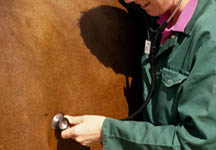The Dublin Horse Show (9 – 13 August) starts today, unperturbed by the threat from “Swamp Fever” or Equine Infectious Anaemia (EIA). A total of fourteen horses have been diagnosed with the fatal virus, but officials are determined Ireland’s biggest equestrian will not be effected. The competition first took place in 1868 and has become an important showcase of the best Irish bred horses as well as developing a market place for them. Cancelling the event would have been devastating for Irish equestrianism: tens of thousands of people attend from all over the world, enjoying international Super League show jumping and top class showing.
Ireland’s Department of Agriculture and Food (DAF) made the following statement about the show: “In view of the comprehensive tracing undertaken, and the Department’s rigorous approach to restricting and testing horses on a risk assessed basis, as well as its very close working arrangement with the Royal Dublin Society, we see no reason why any international competitors should be discouraged from attending and participating at the Dublin Horse Show.”
However, show participants are advised to exercise the highest levels of biosecurity and domestic horses will be kept separated from international horses. “In view of the international importance of the Dublin Horse Show, the showcase event of its kind in this country, the Department is collaborating very closely with the Royal Dublin Society (RDS) to ensure that no horses under restriction or from restricted premises will be allowed to enter the show,” the statement continues.
The DAF also seems to be satisfied that all fourteen outbreaks can be traced to one source – a mare who contracted the disease from mainland Europe in June. “While there are a small number of that category of ‘high-risk’ horses still alive, the Department is satisfied that they have all been traced and both they and the premises on which they are located are subjected to movement restrictions, with no movement of horses allowed onto or from such premises for ninety days,” it said. All blood samples taken on these horses have so far been negative, but movement restrictions will continue until the 90 day period has ended.
Swamp fever, so called because it often occurs in low-lying swamp areas, causes intermittent fever, anaemia, emaciation and even death in horses. It can be transmitted by mechanical transfer of blood by biting insects or infected needles. The recent cases are the first ever recorded in Ireland and are thought to have originated from infected equine blood plasma. The virus poses no risk to humans.
Mainland Britain has placed its own restriction on horses entering from Ireland. From 14 August, Irish racehorses entering mainland Britain will have to test negative for the disease before they are allowed in. Likewise British-based horses travelling to Ireland cannot return until a negative test result is shown.
Dr Peter Webbon, the Chief Executive of the Horseracing Regulatory Authority said: “I have held industry-wide discussions over the past week, and whilst the risk of the spread of the disease within Ireland and over to Great Britain is low, we feel we need to introduce a requirement for testing both to safeguard the British racehorse population and to create a database of movements to which we can refer if the situation in Ireland deteriorates.”




